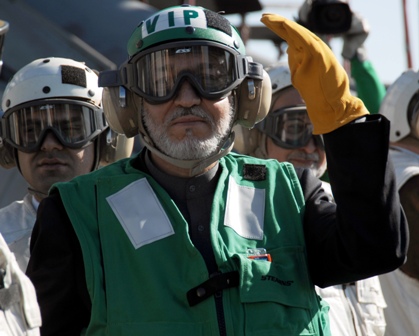Anticorruption Effort in Afghanistan, No. 512
How the U.S. anticorruption crusade in Afghanistan is fueling the problem, starting with President Karzai.
U.S. officials are still urging authorities in Afghanistan to rein in corruption. Ignorant of the realities of this war, our self-deluded anticorruption crusade overlooks the extent to which present U.S. policy fuels the very corruption we seek to curtail.
 COIN experts argue repeatedly that rampant corruption undermines the legitimacy of local authority. Eradicating corruption remains a U.S. goal. But officials in Washington neglect that the longer our Afghan partners remain dependent on foreign patronage, the more it incentivizes their bribery, kickbacks, and other corrupt and abusive practices. New York Times correspondent Dexter Filkins reported how security companies, some owned by relatives of President Hamid Karzai, "wreaked havoc on Afghan civilians" and "have been known to attack villages on routes where [NATO] convoys have come under fire."
COIN experts argue repeatedly that rampant corruption undermines the legitimacy of local authority. Eradicating corruption remains a U.S. goal. But officials in Washington neglect that the longer our Afghan partners remain dependent on foreign patronage, the more it incentivizes their bribery, kickbacks, and other corrupt and abusive practices. New York Times correspondent Dexter Filkins reported how security companies, some owned by relatives of President Hamid Karzai, "wreaked havoc on Afghan civilians" and "have been known to attack villages on routes where [NATO] convoys have come under fire."
In a similar vein, our unholy alliance with Karzai’s half-brother has turned many Afghans away from the central government. The U.S. intelligence community’s influence with Ahmed Wali Karzai, the chairman of Kandahar’s provincial council, might make sense from a military standpoint, since the U.S.-friendly Kandahar Strike Force helps target Taliban in Kandahar. But this influence does little to advance the U.S. objective, as laid out by the White House, of “Promoting a more capable, accountable, and effective government in Afghanistan that serves the Afghan people and can eventually function, especially regarding internal security, with limited international support.”
Supporting a criminal narco-state is one thing, but supporting a criminal narco-state while claiming that it helps achieve a core goal vital to U.S. national security—when it does not—is quite another. Ahmed Wali’s shadow government, condoned by U.S. officials, cuts against that stated mission, and in a narrower sense it cuts against Kabul’s recent anticorruption efforts.
Gilles Dorronsoro, an Afghanistan expert at the Carnegie Endowment for International Peace, highlights the absurdity of pushing anticorruption efforts in Kabul while ignoring the building of credible government institutions in and around Kandahar: “If we don’t really make an effort in Kandahar, where we’ve put all of our bets,” he said, “what are we doing trying to put some Karzai adviser in jail in Kabul?”
Ironically, the more we apply pressure to Karzai, the more we underscore our own responsibility in perpetuating his government’s flagrant graft and corruption.
